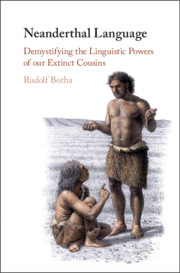11 - Dispersing the Murk
from Part IV - Implications
Published online by Cambridge University Press: 26 April 2020
Summary
Chapter 11 elaborates on a number of points argued in preceding chapters. A first concerns the finding that the inferences drawn about Neandertal language from the Neanderthal behaviours at issue are less than sound. This does not imply that Neanderthals could not have had a form of language. Nor does it imply that non-behavioural attributes of Neanderthals provide better windows on their linguistic attributes. This is substantiated by an appraisal of two important inferences about Neanderthal language drawn from putative correspondences between the brains and genes of Neanderthals and those of modern humans. Both the gene and the brain inference are found to be unsound. A second point concerns the roots of the controversial nature of much that has been claimed about Neanderthal language. An often cited one is the lack of uncontentious evidence about Neanderthal language. The root cause, however, lies deeper in a poor conceptual framework that lacks, inter alia, appropriate conditions on the soundness of inferences. A third point concerns the mysterious nature of Neanderthals’ language. Chapter 11 argues that credible inferences about what it involved can be drawn from Neanderthals’ cooperative hunting. It comprised referential signs but lacked complex grammar.
- Type
- Chapter
- Information
- Neanderthal LanguageDemystifying the Linguistic Powers of our Extinct Cousins, pp. 141 - 157Publisher: Cambridge University PressPrint publication year: 2020

